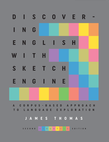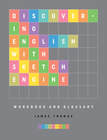Discovering English with Sketch Engine
James Thomas
All books are printed and distributed by Lulu.com and can be ordered from their Versatile page.
They almost always offer discounts via codes which are shown on their home page.
|
Discovering English with Sketch Engine is intended primarily for teachers and advanced students of English as a foreign language. Several aims run in parallel as the reader undertakes guided discovery tasks: in the process of exploring over three hundred language questions, the reader learns how to use all of the relevant Sketch Engine tools. The tasks cover and uncover aspects of vocabulary, grammar, stylistics, discourse and pragmatics. There are two indices: Index of Names and Notions and the Word Focus Index.
Sketch Engine is online software that combines a specialised search engine and many corpora in many languages. The data returned from searches can be presented as concordance lines, collocation lists, word clouds, word sketches, bundles and chunks. The data processing can be at all levels: letters, morphemes, words, clauses, phrases, chunks, sentences and text. Sketch Engine was developed with lexicography in mind and is used by some of the world's major dictionary publishers. This makes it entirely compatible with the lexical focus in contemporary language education, and an ideal vehicle for learning language and about language. Discovering English with Sketch Engine takes its readers on a voyage of guided discovery that ultimately equips them with the knowledge and skills to formulate, ask and solve language queries. This is a skill for life. The second edition was published in April 2016 with numerous small changes, references to newly-available corpora, and several new sections including a chapter on parallel corpora. Accompanying the second edition is a Workbook and Glossary. |
Some language questions explored in DESKE.
About words Can you say handsome woman in English? Do marriages break up or down? How is friend used as a verb? Which two syllable adjectives form their comparatives with more? Do men say sorry more than women? About collocation I’ve come across boldly go a few times and wonder if it is more than a collocation. It would be reasonable to expect the words that follow positively to be positive, would it not? Is there anything systematic about the uses of little and small? What are some adjectives suitable for giving feedback to students? About phrases and chunks Does at all reinforce both positive and negative things? What are those phrase with last … least; believe … ears; lead … horse? How do the structures of to photograph differ from take a photo(graph), guess with make a guess, smile with give a smile? Which –ing forms follow verbs like like? About grammar How do sentences start with Given? Who or whom? Which adverbs are used with the present perfect continuous? Do the subject and verb typically change places in indirect questions? How new and how frequent is the question tag, innit? About text Are both though and although used to start sentences? Equally? How much information typically appears in brackets? Does English permit numbers at the beginning of sentences? Is it really true that academic prose prefers the passive? In Pride and Prejudice, are the Darcies ever referred to with their first names? |



